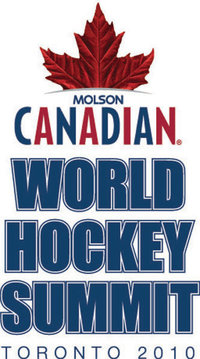World Hockey Summit – Day 4
 The fourth and final day of the 2010 World Hockey Summit focused on moving hockey forward and continuing to spread the good word about Canada’s favourite sport.
The fourth and final day of the 2010 World Hockey Summit focused on moving hockey forward and continuing to spread the good word about Canada’s favourite sport.
After an early breakfast the conference met in the Toronto Sheraton’s downstairs hall to listen to players, coaches and organizers speak about the movement to promote women’s hockey.
Like the previous day’s sessions on the Olympics and a World Hockey Agenda, all the members of the panel acknowledged that the 2010 Vancouver Games had done wonders for their sports’ public profile.
However, unlike Wednesday’s slanging match, keynote speaker Hayley Wickenheiser and the panel of Mel Davidson, Mark Johnson, Arto Sieppi, Angela Ruggiero and Peter Elander all agreed that women’s hockey had to return to the Olympics as well as stage more international and even professional matches.
Ruggiero made an important point about high calibre women’s play: as a member of Team USA she plays, on average, ten games per year. That’s it.
Once a player graduates from the NCAA, there is no viable professional women’s league. An individual looking to improve their game beyond the confines of a varsity program has to arrange her own ice time and practicemates, a surprisingly difficult task.
This lead to a lengthy discussion amongst the panel, and later amongst the break-out groups, about how to go about creating a professional women’s league that would allow elite female players to hone their skill and provide aspiring hockey players with ready-made heroes.
Promoting hockey to women dovetailed perfectly with the afternoon’s session on Growing Participation in hockey.
Tommy Boustedt of Sweden, Sieppi (again) of Finland, Scott Smith of Hockey Canada and Pat Kelleher of USA Hockey all discussed the particular challenges of promoting hockey in their respective countries.
Both Sweden and Finland focus on education of coaches, players and parents through intensive hockey schools open to all amateur players, while USA Hockey is concerned with branching out past the Three Ms: Michigan, Massachusetts and Minnesota.
Canada, of course, doesn’t have to worry about popularizing the game or breaking into new markets. Instead, their focus is on developing accessibility for low-income families and New Canadians as well as promoting women’s and sledge hockey.
Dr. Paul Dennis of the Canadian Hockey League, Cyril Leeder of the Ottawa Senators and John McDonough of the Chicago Blackhawks also contributed by addressing how their organizations interact with local communities to promote hockey and win over new fans to the game.
Although it was the least exciting of the presentations, that final session served as a fitting end to four days of hockey talk. It put a positive spin on the Summit and insured that the hundreds of delegates would be energized to go out and continue their hard work.
Leave a comment